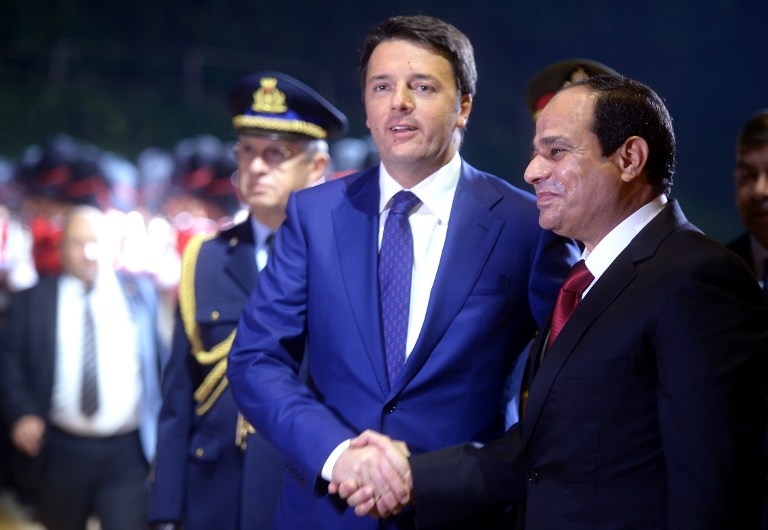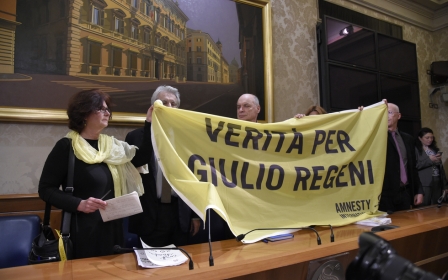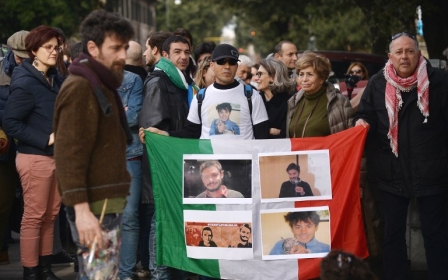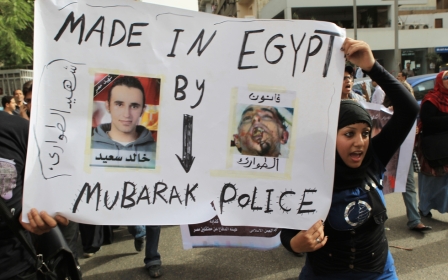ANALYSIS: Rome-Cairo relations turn sour over student's murder

“Let me be very frank. In this moment, Egypt will be saved only by the leadership of Sisi. This is my personal position, and I am proud of my friendship with him. I think Sisi is a great leader, and a personal friend.”
Those were the words of Italian Prime Minister Matteo Renzi praising Egyptian President Abdel Fattah al-Sisi a day after a bomb exploded outside the Italian consulate in Cairo in July 2015.
Renzi has been one of Sisi's staunchest supporters in Europe, and the Egyptian president chose Rome as his first destination when he toured European capitals for the first time as president in 2014.
Now the brutal murder of Italian doctoral student Giulio Regeni risks jeopardising the special relationship nurtured by the two leaders, and Renzi is under increasing pressure to take a tough stance against his Egyptian friend.
Renzi, usually a media-friendly figure, offered no public statement when Regeni's reportedly mutilated and tortured body was found in a suburb of Cairo on 3 February.
The Egyptian presidency said that Sisi had called Renzi to offer his condolences and assure him that Egyptian authorities would work with public prosecutors to “unravel the mystery surrounding the incident,” as well as telling him that Egypt would cooperate fully with Italy.
In reply, Renzi “lauded the positive spirit of cooperation” with which Egypt had dealt with the incident and stressed once again “the friendly relations that bind the two countries and their peoples”.
Yet, two months on, the lack of progress in the inquiry into Regeni's death saw Italy on Friday recall its ambassador from Cairo for talks about the case.
Officials in Rome accuse Egyptian counterparts of withholding key information and documents about the murder, while Italian prosecutors have rejected Egyptian claims that Regeni might have been kidnapped by a criminal gang impersonating policemen or been involved in a sexual crime and run over by a car.
Off the record, Italian diplomats have endorsed suspicions reported in the Italian media that Regeni, who was researching trade unions and political activism, was in fact arrested, tortured and killed by Egyptian security services.
“Unless there is a change of pace [by Egypt], the government is ready to react by adopting immediate and proportional measures,” Italian Foreign Minister Paolo Gentiloni told parliament earlier in the week.
Regeni’s death has shocked Italy, with every major newspaper suddenly paying attention to what is happening across the Mediterranean in Egypt. If most Italians were previously largely oblivious or uninterested in Egypt's poor human rights record, few can now accept a version of events in which the Egyptian security services are not complicit in his killing.
“I cannot tell you what they did to him. I recognised him just by the tip of his nose. The rest of him was no longer Giulio,” said Paola Regeni, Giulio’s mother, speaking movingly in the Italian parliament last week.
For Renzi, the case had become both a personal embarrassment and a political dilemma.
'Bunga bunga' parties
Leaders of Italy and Egypt have long enjoyed a special, if sometimes colourful, relationship. Former prime minister Silvio Berlusconi was so close to Egypt's long-term president Hosni Mubarak that he claimed that that believed a 17-year-old Moroccan girl who attended one of his notorious “bunga bunga” sex parties was Mubarak's niece.
Rome and Cairo are linked together by deep financial and political interests that often transcend political differences or the party in power.
“Historically speaking, Italy and Egypt have had really good relations since the times of King Farouk [who ruled Egypt from 1936 until his death in 1952] and that did not change with Nasser. It was the same even under Morsi’s presidency, as well as under Sisi’s one,” Giuseppe Dentice, a research assistant at the Institute for Studies on International Politics, told Middle East Eye.
Since taking office in 2014, Renzi has ramped up political and economic ties between the two countries, with delegations constantly shuttling between the two countries for regular meetings.
Italy is Egypt's main commercial partner in the European Union, and the Italian oil firm Eni has struck a major deal to explore and manage one of the largest natural gas fields in the Mediterranean, just off the Alexandrian coast.
A high-profile visit by an Italian trade delegation, including representatives of companies ranging from carmaker Fiat Chrysler, oil and gas contractor Saipem and the state-owned railway firm Ferrovie dello Stato, was cut short when Regeni’s body was found.
“The Italian-Egyptian axis is very strong on a set of different regional and Mediterranean issues, including Libya, the fight against terrorism and illegal migration”, said Dentice.
“There is not always a full convergence of interests, as for example on Libya, where Egyptian interventionism clashes with Italy’s efforts to reach a diplomatic solution, but they can be considered close allies.”
'Dealing with a dictatorship'
Renzi has always downplayed human rights violations in Egypt, preferring to stress Cairo’s role in the fight against terrorism and the stability of the Mediterranean.
“We are dealing with a dictatorship, there is no joking about it. We are not delusional about that,” said an Italian diplomat speaking anonymously.
“We are living in an autocratic country where the government can do whatever it wants. But we can’t do much about it to be honest.”
Critics say that Rome may now be paying the price for its “short-sighted” policy in regard to Sisi.
“It did not take into consideration the fragility of the military dictatorship and the risk of being involved in Sisi’s narrative of the war on terror; that is, to consider every opposition - including secular movements and football supporters - as terrorists,” Lucio Caracciolo, editor in chief of Limes, an Italian geopolitical magazine, told MEE.
With Italian officials losing patience and public pressure building, the feeling in Rome is that a line needs to be drawn. For Renzi, the dilemma is that a tough diplomatic stance over Regeni's case could have knock-on consequences for Italian interests elsewhere.
In Libya, Italy could lose an important ally and partner, while the diplomatic stand-off could undermine efforts to find a political solution to the violence and political divisions there. Hundreds of billions of dollars in trade deals could also be at stake.
Meanwhile, the arrival of summer means an expected increase in the number of migrants and refugees attempting to cross from North Africa to Sicily. A breakdown in relations could see Egypt turn a blind eye to the people traffickers and allow hundreds of boats to set sail from its coastline.
Sisi also finds himself in a difficult position.
Bilateral relations are tense not only with Italy but also with Russia and the United Kingdom since the IS-claimed bombing of a Russian passenger plane departing from Sharm el-Sheikh last October and the subsequent cancellation of tourist flights to the Red Sea resort.
Yet for Sisi, it may be that protecting the security apparatus that has so far kept him in power proves to be of more pressing and pragmatic concern than appeasing a foreign ally.
After all, it would be to that same security apparatus - and not to Italy - that he would look in turn for protection in the event of another uprising.
Middle East Eye propose une couverture et une analyse indépendantes et incomparables du Moyen-Orient, de l’Afrique du Nord et d’autres régions du monde. Pour en savoir plus sur la reprise de ce contenu et les frais qui s’appliquent, veuillez remplir ce formulaire [en anglais]. Pour en savoir plus sur MEE, cliquez ici [en anglais].




